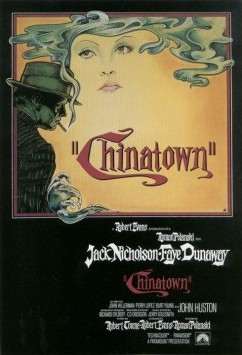
Chinatown is a 1974 American neo-noir mystery film directed by Roman Polanski from a screenplay by Robert Towne. The film stars Jack Nicholson and Faye Dunaway. It was inspired by the California water wars, a series of disputes over southern California water at the beginning of the 20th century, by which Los Angeles interests secured water rights in the Owens Valley. The Robert Evans production, released by Paramount Pictures, was Polanski's last film in the United States and features many elements of film noir, particularly a multi-layered story that is part mystery and part psychological drama.

Charlie Chan is a fictional Honolulu police detective created by author Earl Derr Biggers for a series of mystery novels. Biggers loosely based Chan on Hawaiian detective Chang Apana. The benevolent and heroic Chan was conceived as an alternative to Yellow Peril stereotypes and villains like Fu Manchu. Many stories feature Chan traveling the world beyond Hawaii as he investigates mysteries and solves crimes.
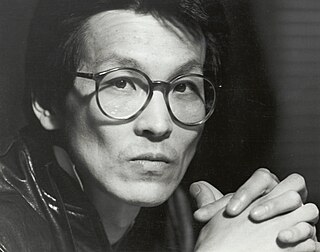
Wayne Wang is a Hong Kong-American film director, producer, and screenwriter. Considered a pioneer of Asian-American cinema, he was one of the first Chinese-American filmmakers to gain a major foothold in Hollywood. His films, often independently produced, deal with issues of contemporary Asian-American culture and domestic life.
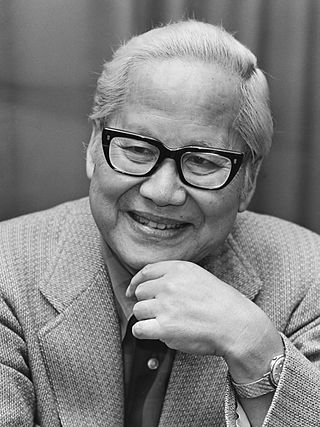
Keye Luke was a Chinese-American film and television actor, technical advisor, artist, and a founding member of the Screen Actors Guild.

Big Trouble in Little China is a 1986 American fantasy action-comedy film co-scored and directed by John Carpenter, and starring Kurt Russell, Kim Cattrall, Dennis Dun and James Hong. The film tells the story of truck driver Jack Burton (Russell), who helps his friend Wang Chi (Dun) rescue Wang's green-eyed fiancée from bandits in San Francisco's Chinatown. They go into the mysterious underworld beneath Chinatown, where they face an ancient sorcerer named David Lo Pan (Hong), who requires a woman with green eyes to marry him in order to be released from a centuries-old curse.
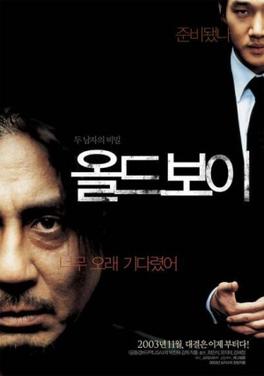
Oldboy is a 2003 South Korean action-thriller film directed and co-written by Park Chan-wook. A loose adaptation of the Japanese manga of the same name, the film follows the story of Oh Dae-su, who is imprisoned in a cell that resembles a hotel room for 15 years without knowing the identity of his captor or his captor's motives. When he is finally released, Dae-su finds himself still trapped in a web of conspiracy and violence as he seeks revenge against his enigmatic captor. His quest becomes tied in with romance when he falls in love with a young sushi chef, Mi-do.
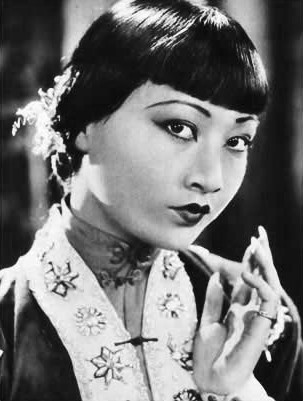
Wong Liu Tsong, known professionally as Anna May Wong, was an American actress, considered the first Chinese American film star in Hollywood, as well as the first Chinese American actress to gain international recognition. Her varied career spanned silent film, sound film, television, stage, and radio.

Benson Fong was an American character actor.
Hong Kong action cinema is the principal source of the Hong Kong film industry's global fame. Action films from Hong Kong have roots in Chinese and Hong Kong cultures including Chinese opera, storytelling and aesthetic traditions, which Hong Kong filmmakers combined with elements from Hollywood and Japanese cinema along with new action choreography and filmmaking techniques, to create a culturally distinctive form that went on to have wide transcultural appeal. In turn, Hollywood action films have been heavily influenced by Hong Kong genre conventions, from the 1970s onwards.

James Hong is an American actor, producer and director. Known as one of the most prolific character actors of all time, he has worked in numerous productions in U.S. media since the Golden Age of Hollywood in the 1950s. In 2022, he received a star on the Hollywood Walk of Fame for his contributions to the American film and television industries.

Police Story 4: First Strike, also known as First Strike or Jackie Chan's First Strike, is a 1996 Hong Kong action comedy film directed and co-written by Stanley Tong, and starring Jackie Chan, Jackson Lou, Annie Wu, Bill Tung, Yuri Petrov, and Nonna Grishayeva. It is the fourth installment of the Police Story series. Chan reprises his role as "Kevin" Chan Ka-Kui, a Hong Kong police officer who works for the CIA to track down and arrest an illegal weapons dealer. Jackie realizes that things are not as simple as they appear and soon finds himself a pawn of an organization posing as Russian intelligence.

The Joy Luck Club is a 1993 American drama film about the relationships between Chinese-American women and their Chinese immigrant mothers. It was directed by Wayne Wang and stars Tsai Chin, Kieu Chinh, Lisa Lu, France Nuyen, Rosalind Chao, Lauren Tom, Tamlyn Tomita, and Ming-Na Wen. The film is based on the 1989 novel of the same name by Amy Tan, who co-wrote the screenplay with Ronald Bass. The film was produced by Bass, Tan, Wang, and Patrick Markey, while Oliver Stone served as an executive producer. Four older women, all Chinese immigrants living in San Francisco, meet regularly to play mahjong, eat, and tell stories. Each of these women has an adult Chinese-American daughter. The film reveals the hidden pasts of the older women and their daughters, and how their lives are shaped by the clash of Chinese and American cultures as they strive to understand their family bonds and one another.
Portrayals of East Asians in American film and theatre has been a subject of controversy. These portrayals have frequently reflected an ethnocentric perception of East Asians rather than realistic and authentic depictions of East Asian cultures, colors, customs, and behaviors.
Americanese is a 2006 American romantic drama film directed by Eric Byler and starring Chris Tashima, Allison Sie, Kelly Hu, Ben Shenkman, Autumn Reeser, and Joan Chen. It is based on the novel American Knees by Shawn Wong, concerning the relationships of a man and woman of East Asian descent in the United States.
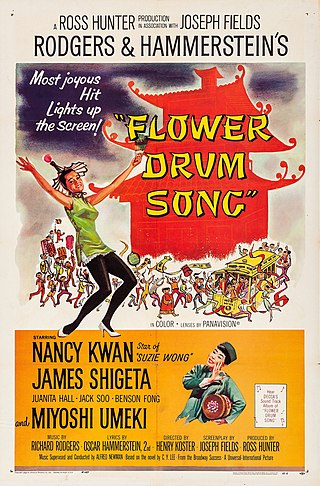
Flower Drum Song is a 1961 American musical film directed by Henry Koster, adapted from the 1958 Broadway musical Flower Drum Song, written by the composer Richard Rodgers and the lyricist/librettist Oscar Hammerstein II, in turn based on the 1957 novel of the same name by the Chinese American author Chin Yang Lee. The film stars Nancy Kwan, James Shigeta, Miyoshi Umeki, Jack Soo, Benson Fong and Juanita Hall. It was nominated for five Academy Awards and two Golden Globe Awards, including Best Motion Picture – Musical or Comedy.

Dim Sum: A Little Bit of Heart is a 1985 American comedy film directed by Wayne Wang and starring Laureen Chew, Kim Chew, Victor Wong, Ida F. O. Chung, Cora Miao, Amy Hill, and Joan Chen.
Hong Kong Americans, include Americans who are also Hong Kong residents who identify themselves as Hong Kongers, Americans of Hong Kong ancestry, and also Americans who have Hong Kong parents.

Wood Moy was an American film and theater actor from New York City. He developed an interest in acting while attending St. John's University, Shanghai. He was an early member of the Asian American Theater Company in San Francisco. He is best known for a lead role in Chan Is Missing, the debut film by Wayne Wang.

Peter Wang is a Taiwanese actor and director from Beijing. He is best known for writing and directing the 1986 film, A Great Wall, the first American feature to be co-produced by the People's Republic of China.

Laureen Chew is an American academic and actress. She is Professor Emerita of Asian American studies at San Francisco State University. She acted in two Wayne Wang films in the 1980s, both of which were shot in San Francisco.





















